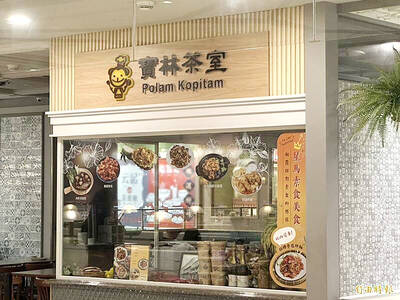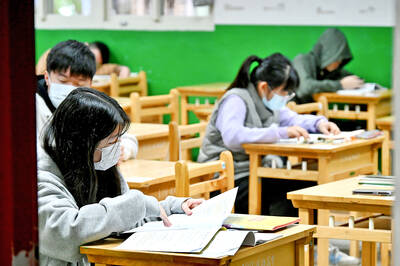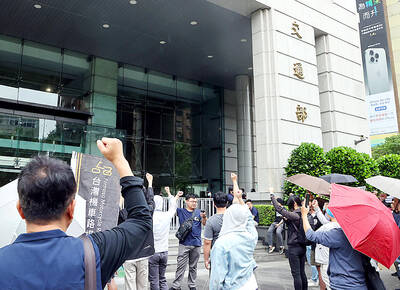E-cigarette use in Taiwan has tripled since 2018, a study by the Ministry of Health and Welfare’s Health Promotion Administration (HPA) said yesterday.
E-cigarette use grew from 0.6 percent in 2018 to 1.7 percent last year, said the study, which last year garnered responses from 25,000 people aged 18 or older.
The age groups with the highest rates of use were men aged 26 to 30 (6.3 percent) and women aged 21 to 25 (4.6 percent), the HPA said.
“To put this growth into perspective, use of traditional cigarettes grew only marginally over this period, from 13 percent in 2018 to 13.1 percent in 2020,” HPA Tobacco Control Division official Lu Meng-ying (呂孟穎) said. “The situation needs urgent attention, especially as new e-cigarette users are almost all young people.”
Asked why they use e-cigarettes, 38.9 percent of respondents said it was due to curiosity, 17.3 percent said it was an attempt to quit regular cigarettes and 9.7 percent said it was because their friends use them.
“The UN says that e-cigarettes are ineffective as a means of quitting regular cigarettes, so this motivation is worrying,” Lu said.
E-cigarettes and heated tobacco products — devices that heat tobacco leaves, as opposed to the oils used in e-cigarettes — are just as unhealthy as traditional tobacco products, he said.
The use of flavored tobacco products is also on the rise, increasing from 8.2 percent of respondents aged 18 to 40 in 2018 to 15.6 percent last year, Lu said.
Of the users of flavored tobacco interviewed last year, 41.7 percent were women and 12.5 percent were men, he said.
Of the women, 68.2 percent were aged 21 to 25, and 68.1 percent of the men were 18 to 20, he said.
“There are more than 1,200 additives used in flavored-tobacco products, and the vast majority of them are chemically derived,” he said. “The goal of manufacturers is to prevent new smokers, especially young women, from being turned off by foul smells.”
While the chemicals might be harmless in small doses, the effects of long-term use are not well understood, he said.

POLAM KOPITIAM CASE: Of the two people still in hospital, one has undergone a liver transplant and is improving, while the other is being evaluated for a liver transplant A fourth person has died from bongkrek acid poisoning linked to the Polam Kopitiam (寶林茶室) restaurant in Taipei’s Far Eastern Sogo Xinyi A13 Department Store, the Ministry of Health and Welfare said yesterday, as two other people remain seriously ill in hospital. The first death was reported on March 24. The man had been 39 years old and had eaten at the restaurant on March 22. As more cases of suspected food poisoning involving people who had eaten at the restaurant were reported by hospitals on March 26, the ministry and the Taipei Department of Health launched an investigation. The Food and

CHANGES: After-school tutoring periods, extracurricular activities during vacations or after-school study periods must not be used to teach new material, the ministry said The Ministry of Education yesterday announced new rules that would ban giving tests to most elementary and junior-high school students during morning study and afternoon rest periods. The amendments to regulations governing public education at elementary schools and junior high schools are to be implemented on Aug. 1. The revised rules stipulate that schools are forbidden to use after-school tutoring periods, extracurricular activities during summer or winter vacation or after-school study periods to teach new course material. In addition, schools would be prohibited from giving tests or exams to students in grades one to eight during morning study and afternoon break periods, the

Advocates of the rights of motorcycle and scooter riders yesterday protested in front of the Ministry of Transportation and Communications in Taipei, making three demands. They were joined by 30 passenger vehicles, which surrounded the ministry to make three demands related to traffic regulations — that motorcycles and scooters above 250cc be allowed on highways, that all motorcycles and scooters be allowed on inside lanes, and that driver and rider training programs be reformed. The ministry said that it has no plans to allow motorcycles on national highways for the time being, and said that motorcycles would be allowed on the inner

AMENDMENT: Contact with certain individuals in China, Hong Kong and Macau must be reported, and failure to comply could result in a prison sentence, the proposal stated The Chinese Nationalist Party (KMT) and the Taiwan People’s Party (TPP) yesterday voted against a proposed bill by Democratic Progressive Party (DPP) lawmakers that would require elected officials to seek approval before visiting China. DPP Legislator Puma Shen’s (沈伯洋) proposed amendments to the Act Governing Relations Between the People of the Taiwan Area and the Mainland Area (臺灣地區與大陸地區人民關係條例), stipulate that contact with certain individuals in China, Hong Kong and Macau should be reported, while failure to comply would be punishable by prison sentences of up to three years, alongside a fine of NT$10 million (US$309,041). Fifty-six voted with the TPP in opposition